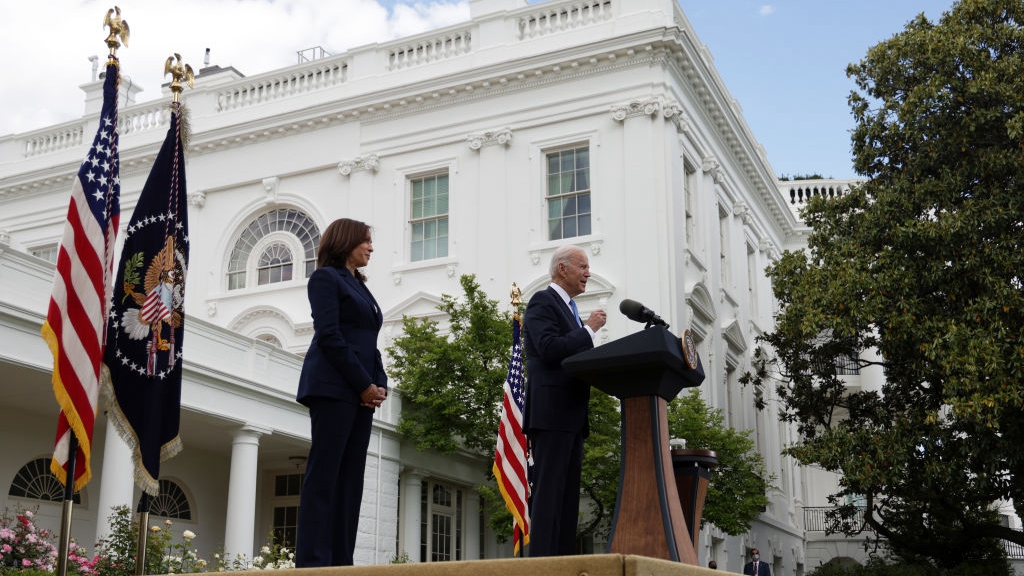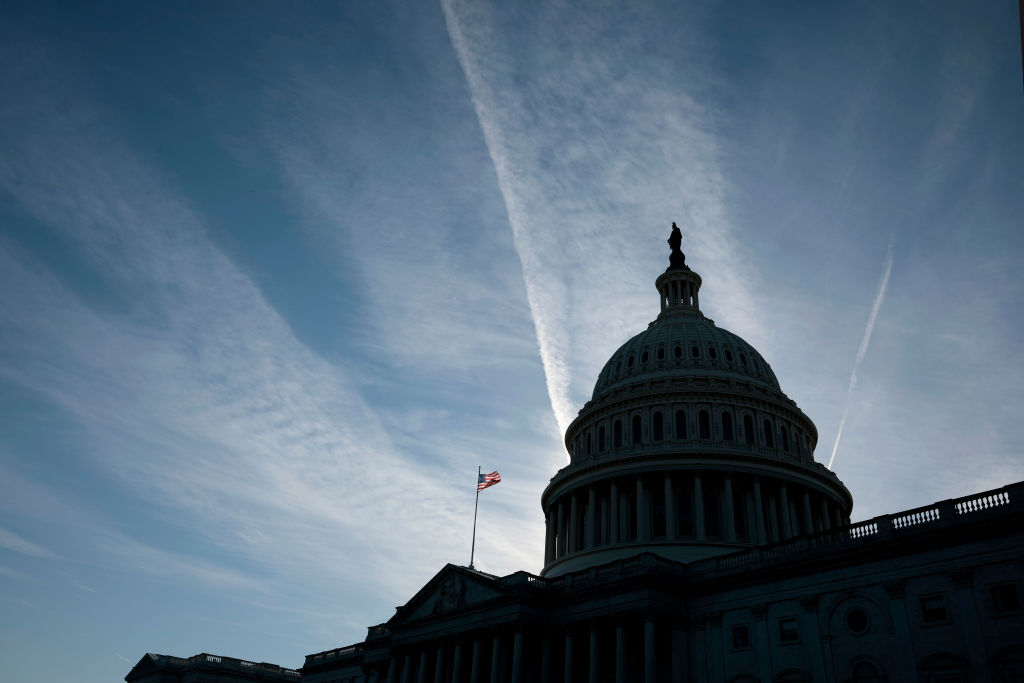
U.S. President Joe Biden delivers remarks as Vice President Kamala Harris listens in the Rose Garden of the White House in Washington, D.C., May 13, 2021. /Getty
U.S. President Joe Biden delivers remarks as Vice President Kamala Harris listens in the Rose Garden of the White House in Washington, D.C., May 13, 2021. /Getty
Editor's note: Danny Haiphong is an independent journalist and researcher in the United States. He is a contributing editor to the Black Agenda Report, co-editor of Friends of Socialist China and founding member of the No Cold War international campaign. The article reflects the author's opinions and not necessarily the views of CGTN.
The Biden administration is set to hold its "Summit for Democracy" beginning December 9. The summit comes after a period of positive dialogue between the United States and China. China and the U.S. ended COP26 with a joint declaration on the climate crisis.
Less than a week later, Chinese President Xi Jinping and his U.S. counterpart Joe Biden took part in a virtual meeting that further emphasized a spirit of cooperation. Experts from both countries believed that the meeting boosted momentum toward the removal of Trump-era tariffs which continue to harm U.S. economic interests. However, the "Summit for Democracy" possesses a clear political agenda that contradicts the progress made in recent U.S.-China talks.
According to the U.S. Department of State, the purpose of the Summit is to engineer a "democratic renewal" in the U.S. and around the world. Yet there is nothing new about the U.S. approach to democracy.
The U.S. has long equated democracy with hegemony. Any country that the U.S. perceives as a "threat" to its hegemony has faced brutal acts of aggression including sanctions and military intervention. From a global perspective, U.S. hegemony is fundamentally undemocratic and exclusionary.
The Summit repeats the U.S. policy of exclusion in world affairs. China did not receive an invitation despite its dutiful respect for international law and a multipolar world order. While China does not ascribe to "Western" electoral democracy, it does offer a model of whole process people's democracy that emphasizes popular participation in the economic and social development of the nation.
Instead of merely holding regular elections for representatives who make a profitable career from politics, whole process people's democracy emphasizes an integration of the people's wellbeing and the governance system.
Deputies at the county level are voted into their positions by local constituents. A record of service to the people and nation offers local deputies the opportunity to be elected into higher positions by the people's congresses of cities, provinces, and the National People's Congress (NPC).
The U.S. decision to exclude China's form of democracy from the Summit is part of a larger political agenda. The U.S. media and foreign policy establishment have spent more than two years promoting a negative image of China to Americans and so-called allies around the world.
Anti-China propaganda has served as the basis for dangerous U.S. policies that have yet to be rolled back under the Joe Biden administration. These policies include the military encirclement of China, sanctions on Chinese technology companies such as Huawei, and direct political interference in China's affairs. Constantly placing China in a negative light has also allowed U.S. political officials to avoid accountability for domestic ills such as the massive damage caused to U.S. society by COVID-19.
However, China is not the only country excluded from the Summit. The 30-plus nations currently suffering under U.S.-imposed sanctions did not receive an invitation either. These nations include Cuba, Venezuela, Zimbabwe, Eritrea and Belarus.

The U.S. Capitol Dome is seen in Washington, DC, November 18, 2021. /Getty
The U.S. Capitol Dome is seen in Washington, DC, November 18, 2021. /Getty
Furthermore, the U.S. media have actively taken part in shaping the Summit's exclusionary agenda. Writing for Foreign Policy magazine, Richard Fontaine of the weapons manufacturer-funded Center for a New American Security (CNAS) and Jared Cohen of the Council on Foreign Relations (CFR) argued that the summit for Democracy should make its aim to defend "democracy" from China and Russia explicit.
The Washington Examiner published an article from a senior fellow at the Jamestown Foundation, a neoconservative think-tank, arguing that the summit should openly support efforts to transform "Russia's repressed regions into viable states."
The U.S. media has therefore revealed the underlying motivation for the Summit for Democracy. Democracy is being used by the United States as a cover for hegemonic ambitions. This politicization of democracy threatens to undermine the possibility that dialogue between the U.S. and China will lead to a concrete shift in relations in a positive direction.
Powerful forces in the U.S.'s defense industry, intelligence apparatus, and big business remain committed to portraying China and any country that exercises sovereignty as a "threat" to so-called civilization itself. The influence of these actors is likely to sow further confusion in the Biden administration's policy orientation toward China, a scenario that favors stalemate over peace and cooperation.
The Summit offers a convenient platform for the spread of platitudes but is unlikely to provide solutions to the ills plaguing the United States. Successive U.S. administrations have been unable to slow the decline of domestic living standards and have shown little interest in promoting a world order based on peace and cooperation.
Instead of attempting to reassert unipolar leadership over world affairs, the U.S. must understand that its problems can only be solved by taking responsibility for domestic woes and ceasing exclusionary activities like the Summit which only serve to justify a counterproductive foreign policy reliant upon war and conflict.
(If you want to contribute and have specific expertise, please contact us at opinions@cgtn.com.)

